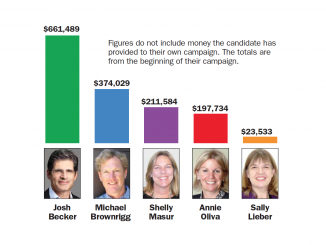
BY EMILY MIBACH
Daily Post Staff Writer
Due to ever rising pension costs, Redwood City officials are asking residents to increase the city’s sales tax a half-cent, but some residents are objecting to the tax, saying it hits low-income residents hard.
“It impacts the poor and folks on fixed incomes the most. This is the best they can do? It’s like a cruel joke — going after folks on moderate fixed incomes to underwrite profligate pensions,” resident C.J. Roses wrote in a post on NextDoor.
At the July 23 meeting, when the council voted to put the tax on the ballot, resident Claire Felong, who used to work as a CPA, called the measure regressive because it takes a larger percentage of a low-income family’s income than it does a high-income family.
If the tax known as Measure RR passes, it will boost the city’s sales tax rate from 8.75% to 9.25%. The sales tax might go to 9.75% if, in the same election, San Mateo County voters approve a sales tax measure for SamTrans and other transit projects.
City has been generating surpluses
The new Redwood City tax will bring in about $8 million annually. The city ran surpluses of $26 million in the fiscal year ending June 30, 2017, and $31 million the previous year. But City Manager Melissa Stevenson Diaz told council at a July 23 meeting that the city’s payments to CalPERS, the state pension program, are expected to double in the next five years, plunging the city budget into a $12 million annual deficit.
The tax proceeds would go directly into the city’s general fund and could be used by the police, fire, library and parks and recreation departments, which represent 80% of the city budget. Those departments would have to be cut if the tax doesn’t pass and the city has to shift more money into CalPERS.
Vice Mayor Diane Howard, who is seeking re-election to council, supports the tax. She points out that the tax is just one part of a 10- to 15-year-long process to address the CalPERS pension debt, an issue that all cities and school districts in the state face. Howard pointed out that aside from the tax, city officials have been working to address the predicted deficit reducing benefits for newly-hired employees and increasing contributions by employees.
The city is also addressing the pension shortfall by asking voters in this election to approve a 10% tax on cannabis businesses.
Hotel tax likely in two years
Howard said that the city will have to look at ways to increase revenues by partnering with other cities or jurisdictions to share services or personnel, or perhaps provide services that other jurisdictions may need. She said that an increase in the city’s hotel tax will likely appear on a 2020 ballot.
Roses, in his NextDoor post, predicted that the word “pension” would not appear on the ballot — saying that instead there will be “some poll-tested language about ‘preserving 911 response times.”
In fact, the ballot argument, signed by Mayor Ian Bain, former mayor Jeff Ira, Library Board member Janet Lawson, business owner Mary Parden and real estate agent Arnoldo Arreola, does not include the word pensions but does say “Due to state mandated cost increases, Redwood City faces a structural budget deficit ahead.” It then goes on to say that the city has only two options for solving the city’s impending deficit: make large cuts to public safety and libraries or pass Measure RR.
But council candidate Diana Reddy said she would have pushed for a head tax on businesses or a square-footage tax on large tech campuses. That’s what Mountain View and East Palo Alto are doing, respectively, to make sure their budgets stay balanced amid the rising pension costs.
The argument for the ballot measure goes on to say if the tax is not passed, there will be cuts to after school programs, emergency services and libraries. No one filed a ballot argument against the tax.



